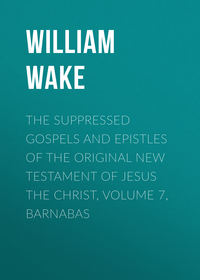Kitabı oku: «The suppressed Gospels and Epistles of the original New Testament of Jesus the Christ, Volume 7, Barnabas», sayfa 7
CHAPTER XV
Of the way of darkness; that is, what kind of persons shall be for ever cast out of the kingdom of God.
BUT the way of darkness is crooked, and full of cursing. For it is the way of eternal death, with punishment; in which they that walk meet those things that destroy their own souls.
2 Such are; idolatry, confidence, pride of power, hypocrisy, double- mindedness, adultery, murder, rapine, pride, transgression, deceit, malice, arrogance, witchcraft, covetousness, and the want of the fear of God.
3 In this, walk those, who are the persecutors of them that are good; haters of truth; lovers of lies; who know not the reward of righteousness, nor cleave to any thing that is good.
4 Who administer not righteous judgment to the widow and orphan; who watch for wickedness, and not for the fear of the Lord;
5 From whom gentleness and patience are far off: who love vanity, and follow after rewards; having no compassion upon the poor; nor take any pains for such as are heavy laden and oppressed.
6 Ready to evil speaking, not knowing him that made them; murderers of children; corrupters of the creature of God; that turn away from the needy; oppress the afflicted; are the advocates of the rich, but unjust judges of the poor; being altogether sinners.
7 It is therefore fitting that learning the just commands of the Lord, which we have before mentioned, we should walk in them. For he who does such things shall be glorified in the kingdom of Hod.
8 But he that chooses the other part, shall be destroyed, together with his works. For this cause there shall be both a resurrection, and a retribution.
9 I beseech those that are in high estate among you, (if so be you will take the counsel which with a good intention I offer to you,) you have those with you towards whom you may do good; do not forsake them.
10 For the day is at hand in which all things shall be destroyed, together with the wicked one. The Lord is near, and his reward is with him.
11 I beseech you, therefore, again, and again, Be as good lawgiver's to one Another; continue faithful counsellors do each other remove from among you all hypocrisy.
12 And may God, the Lord of all the world, give you wisdom, knowledge, counsel, and understanding of his judgments in patience:
13 Be ye taught of God; seeking what it is the Lord requires of you, and doing it; that ye may be saved in the day of judgment.
14 And if there be among you any remembrance of what is good, think of me; meditating on these things, that both my desire and my watching for you may turn to a good account.
15 I beseech you; I ask it as a favour of you; whilst you are in this beautiful tabernacle of the body, be wanting in none of these things; but without ceasing seek them, and fulfil every command, For these things are fitting and worthy to be done.
16 Wherefore I have given the more diligence to write unto you according to my ability, that you might rejoice. Farewell, children of love and peace.
17 The Lord of glory and of all grace, be with your spirit, Amen.
[The end of the Epistle of Barnabas the Apostle, and fellow-traveller of St. Paul the Apostle.]
REFERENCES TO THE GENERAL EPISTLE OF BARNABAS
[Barnabas was a companion and fellow-preacher with Paul. This Epistle lays a greater claim to canonical authority than most others. It has been cited by Clemens, Alexandrinus, Origen, Eusebius, and Jerome, and many ancient Fathers. Cotelerius affirms that Origen and Jerome esteemed it genuine and canonical; but Cotelerius himself did not believe it to be either one or the other; on the contrary, he supposes it was written for the benefit of the Ebionites, (the christianized Jews,) who were tenacious of rites and ceremonies. Bishop Fell feared to own expressly what he seemed to be persuaded of, that it ought to be treated with the same respect as several of the books of the present canon. Dr. Bernard, Savilian professor at Oxford, not only believed it to be genuine, but that it was read throughout in the churches of Alexandria, as the canonical Scriptures were. Dodwell supposed it to have been published before the Epistle of Jude, and the writings of both the Johns. Vossius, Dupuis, Dr. Cane, Dr. Mill, Dr, S. Clark, Whitson, and Archbishop Wake also esteemed it genuine: Menardus, Archbishop Land, Spanheim, and others deemed it apocryphal.]
